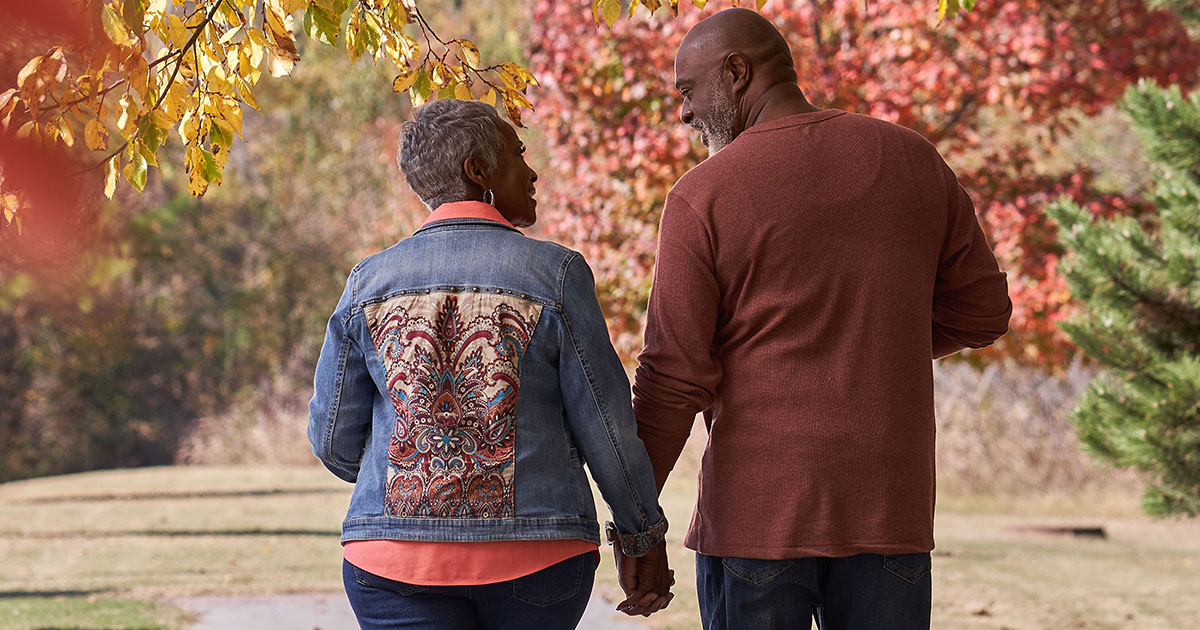
Body image concerns can affect any woman’s self-esteem. Faced with a constant barrage of messages about the ideal body type, many women find themselves drowning in nitpicking—finding fault with everything from head to toe and hip to hip.
Because breast cancer is one of the main cancers that can cause visible changes outside of hair loss, a breast cancer diagnosis can exponentially compound a woman’s feelings of inadequacy, says Alexandria Callahan, LCPC, BC-DMT, GLCMA, Behavioral Health Therapist at City of Hope® Cancer Center Chicago.
That can affect intimacy, which is typically already challenging during treatment.
“Desire can wax and wane because of treatment,” says Cynthia Ingram, BS, RN, HN-BC, COHN-S, Sexual Health and Intimacy Nurse at City of Hope Chicago. “Many times, people are fatigued and exhausted, and sex isn’t even on their to-do list.”
Callahan and Ingram discussed intimacy for breast cancer patients in a recent episode of the Real Pink podcast by Susan G. Komen®.
In this article, we’ll explore:
- Breast cancer treatment’s impact on intimacy
- The importance of intimacy during cancer treatment
- Tips for strengthening intimacy after a cancer diagnosis
If you’ve been diagnosed with cancer and are interested in a second opinion on your diagnosis and treatment plan, call us or chat online with a member of our team.
Breast cancer treatment’s impact on intimacy
During breast cancer treatment, you may feel ashamed or embarrassed of how you look. Or you may feel like your partner is pulling away from you—fearful that if they touch you, they’ll hurt you. That may make you react by pulling away from them.
You also may experience sensation changes in the breast, which may make you want to avoid being touched. Or you may come to think of your breasts as clinical specimens during cancer treatment—not parts of the body linked to sensuality and intimacy.
“Most women with breast cancer undergo treatment options that include the removal of one or both of their breasts,” Callahan says. “Many women speak about losing part of their femininity, or what defines them as a woman. They also question whether their partner will still find them attractive if they can’t even bear to look at themselves in the mirror.”
Stress can also impact the body, making you feel emotionally raw and irritable.
Hormone-positive breast cancers
Women whose cancer is fueled by the hormones estrogen or progesterone may face additional barriers to intimacy.
For example, if you’re still having periods when you’ve been diagnosed with a hormone-positive breast cancer, treatment—which often includes hormone-suppressive therapies—may force your body into early menopause. While menopause’s normal side effects occur gradually over the course of three to seven years, forced menopause is a much more rapid transition, causing abrupt emotional and physical changes, like fluctuations in sexual desire, intense hot flashes, fatigue, weight gain and hair loss.
Also, because the female urogenital system, which contains organs of the reproductive and urinary systems, is fed by estrogen, you may experience vaginal dryness, itching and irritation. The loss of estrogen can also thin vaginal tissue and reduce blood flow to the pelvic region and, as a result, the vagina.
All of this may contribute to discomfort or even pain during sex.
The importance of intimacy during cancer treatment
Still, confiding in someone you trust during cancer treatment is a critical part of the journey. And studies have found that patients report having a better quality of life and feeling more attractive when they have a supportive partner they can trust with intimate details.
“Having someone you can talk to and share your feelings with is very important,” Ingram says on the podcast.
It’s also important to understand that the term intimacy refers to more than sex. It encompasses emotional, intellectual and spiritual connections. In fact, if you don’t have a strong bond in the nonphysical areas of intimacy, it may be hard to foster a physical one.
Talk with your doctor about challenges to intimacy that may be caused by your cancer or its treatment. Asking your care team what to expect in advance will help reduce anxiety and help you—and your partner—better prepare.
“I suggest scheduling time to connect, maybe just to kiss,” Ingram says. “Hug, cuddle and engage when you’re not exhausted and actually have energy.”
Tips for strengthening intimacy after a cancer diagnosis
Here are more tips for keeping intimacy alive during breast cancer treatment:
- Communicate with your partner about areas where you’re comfortable being touched, and areas where you’re not. Ask whether they have concerns about hurting you and reassure them if touch won’t cause you pain.
- Explore alternate forms of intimacy, like hugging, cuddling and simply setting aside time to talk.
- Sit with your feelings, then write them down and make a date to share them with your partner.
- Use an over-the-counter vaginal moisturizer to prevent dryness.
If you’ve been diagnosed with cancer and are interested in a second opinion on your diagnosis and treatment plan, call us or chat online with a member of our team.


